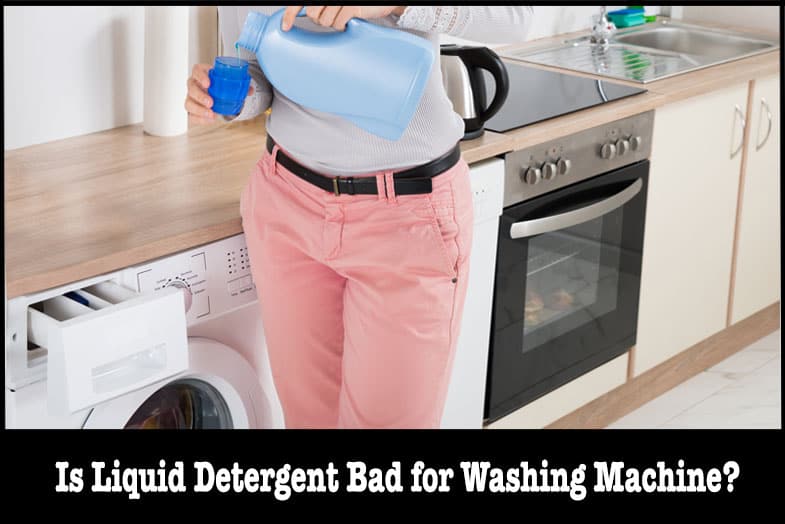Powdered laundry detergent can aggressively damage your washing machine. But how about the laundry detergent? Is it also bad for a washing machine?
Liquid detergent already comes in a solution form, so there is no way that liquid detergent damages your washing machine. However, it can actually damage the washing machine over time. But that damage is usually not more than clogging, so it can be repaired easily.
Liquid detergent does not cause any serious damage to a washing machine. However, it is still a detergent, and it contains chemicals. Therefore, we can expect a little bad from liquid detergents.
Damage Caused by Liquid Detergent
Most of the liquid detergents of famous brands use rendered animal fats as surfactants. Surfactants are important in lowering the surface tension of the water so that dust particles suspend easily and then they effectively get removed. The presence of animal fats in the surfactant becomes responsible for clogging up solenoid valves and lines.
Over time, these washing machines completely get clogged with congealed liquid laundry detergents. However, these animal fats are not much of a problem, and they can be cleaned easily. The washing machine requires usual service. If you keep good maintenance of the washer, you will never face this issue.
Animal fat surfactants can be found in both liquid and powdered detergents. Both types of detergents can be an issue for your washing machine.
Read More: Are Liquid Detergents Better than Powder?
Homemade Liquid Detergent
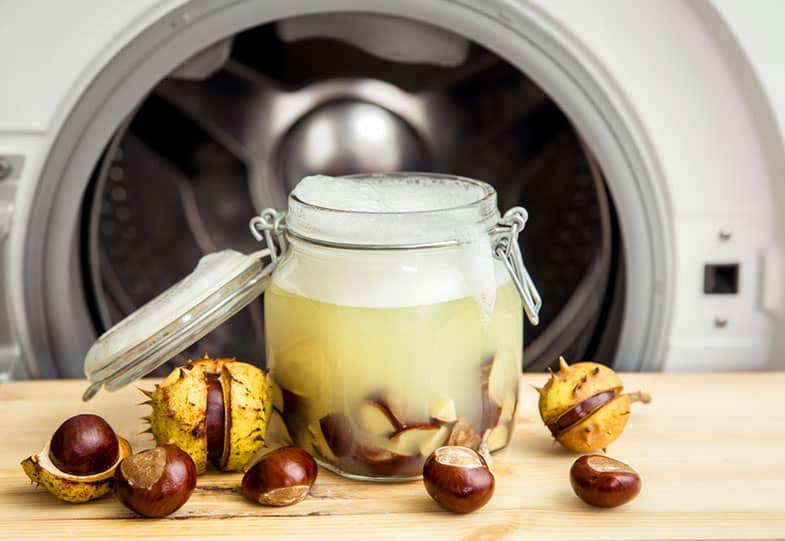
We try to get rid of chemicals present in conventional detergent by making chemical-free DIY laundry detergent at home. Though it actually reduces pollution and saves aquatic life, it is damaging our washing machine.
Liquid detergents made at home often leave more residues than those conventional liquid detergents. This provides space for bacteria and molds to grow inside the washer.
Homemade laundry detergents are formulated with boosters, soap, and water softeners. The major portion is water softeners. Then there comes the soap, which is normally melted. OxiClean is a common booster used in homemade detergents. All these things combine up to form liquid detergent.
Our major concern here is a soap that is used in the liquid detergents. These soaps are the major cause of damage to the washing machine.
Read More: What Makes Laundry Detergent Eco- Friendly?
Why are Soaps Dangerous to Washing Machines?
Soaps are made with fats and oils. These are saponified in the process. On the other hand, detergents are made with surfactants, which is formed by a series of complex chemical reactions that cannot be performed at home.
Soaps are good at cleaning clothes. They can do well only on the smooth and nonporous surfaces like our skin. Since all types of fabrics contain small holes, soaps cannot penetrate deep into those pores to clean them effectively.
Another damage that soaps do is to washing machines. Washers are designed to wash clothes with detergent and not soaps. Even with minimum friction, detergent easily removes the dirt from clothes and clean them without leaving any residue behind. Soaps cannot do so, and they always leave a good amount of residue in the washer.
These residues of soap can build up in the washing machine over time, ultimately damaging it.
Using Too Much Liquid Detergent
Many people think that the more detergent I will use, the better it will be for the clothes. No! This concept is completely wrong. In search of gold (clean clothes), you are losing diamond (washing machine). Adding more detergent to the washing machine can actually damage it.
The fault is not always ours. Many times the caps of liquid detergent bottles can be the reason behind overdose. You may be adding the capful of detergent, considering it as the right amount. But these caps can be bigger sometimes. The best way is to mark a line on the cap or start using a measuring cup.
Lint levels increase as you use too much laundry detergent. This occurs due to the formation of a film on the clothes. Continuous use of detergent leads to blockage, which ultimately causes the water to back up. These damages are likely to occur in high-efficiency washing machines.
How do I know if I am Using Too Much Laundry Detergent?
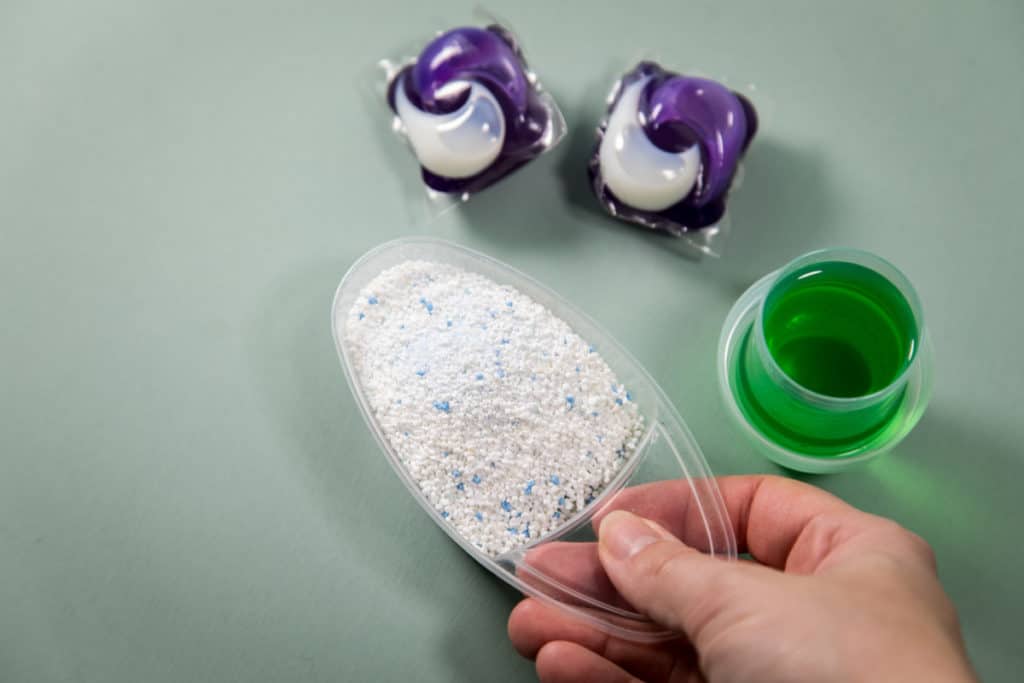
The most common thing that tells you about the presence of too much laundry detergent is suds. If you see a lot of them in the washer, then know that you added a lot of detergent.
Due to the excessive addition of detergent, suds start leaking out of the washing machine. This situation is an indicator that you should reduce the detergent quantity.
When clothes are washed in detergent in excessive amount, then it doesn’t wash off the clothes properly. The clothes, even after washing, appears dull. On wearing, they feel itchy. Also, the excessive detergent leaves spots on the clothes as they do not rinse off properly.
Another indicator can be the foul smell that spread in the washing machine due to bacteria and mold growth. A high level of suds can leave residue in the washing machine, which can become a home for microorganisms.
Read More: Laundry Detergent: Before or After Clothes?
How to Remove Excess Liquid Detergent?
Intentionally or unintentionally, we all pour in more liquid detergent in the washer than needed. At this point, you don’t have to panic. The suds can get removed quite easily. Follow these simple instructions.
Most of the washing machine has an option of cleaner cycle. Make use of this option and run it once, preferably with the addition of a washer cleanser. This will completely clean the residues from the washing machine.
In case you own a machine without the option of cleaning cycle, then still it’s not an issue. You can pour half a cup of vinegar into the detergent compartment of the washer. Let the machine stay empty. Run a rinse cycle once to get the residues removed.
Using Liquid Detergent in a Frontload Washing Machine
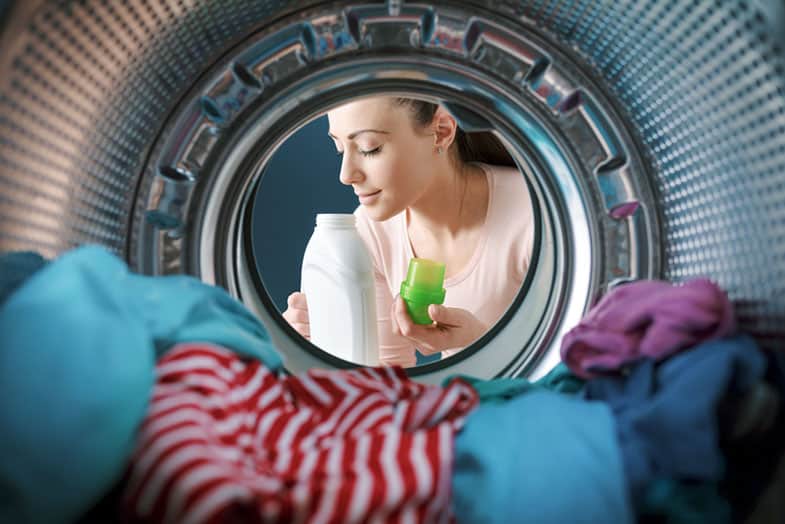
Sometimes overdosing on liquid laundry detergent does not become an issue; rather, the wrong liquid detergent can destroy your machine.
Here, I am talking about the front-load washing machine, which is quite sensitive compared to the top-load machines. When the washer is of high efficiency as well as front-load, the situation becomes even more sensitive.
Simple top-load washing machines can be filled with a lot of detergent, and they can easily dissolve. You can pour in capfuls of detergent into the washer. The washer can fill up to 105 liters of water per fill. Adding more detergent or water to such washing machines are unlikely to deteriorate them. However, in the long run, it can be damaging.
High-efficiency front-load washing machines use less water. Therefore, it requires a type of detergent that can be effective in its least amount. These washing machines do not carry more than 34 liters of water.
Type of Detergent
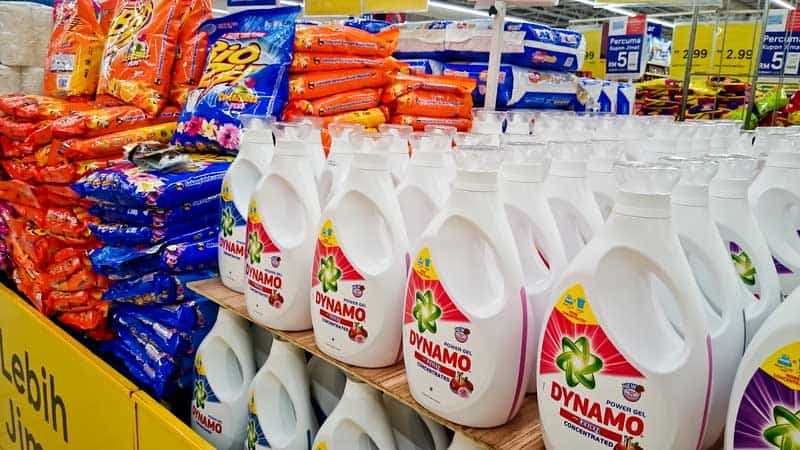
No matter what type of detergent you are using in a high-efficiency washer, the suds level reaches its max during the wash cycle. Also, conventional detergents work effectively for a short time only as simple washers have a wash cycle of around 10 to 15 minutes. On the other hand, HE washers have a longer cycle, and so it needs a detergent that remains active for a long time.
Damage due to Too Much Detergent
Using a lot of detergent in a high-efficiency washing machine leads to the formation of too many suds. When the residue of these suds gets stuck in the washer, they are likely to damage several parts of the washer. One of which is corrosion of aluminum support that is attached to the steel basket. Once this part gets damaged, it becomes hell difficult to repair it.
The rear tub seal is another thing that is likely to get damaged. As a result, your washing machine will become completely useless.
Solution
There are several high-efficiency detergents available in the market. These detergents are made especially for high-efficiency washers. Even a small amount of these detergents would be enough to clean a load of clothes without damaging the washer.
In case of really dirty laundry, you should avoid adding more detergent. It will do more harm than good. You can presoak the clothes for better cleaning.
This can save both the detergent and your washing machine.
Key Takeaway
Liquid detergent is not really damaging to your washing machine in any way. If used in the correct amount, they work just fine. In fact, it is recommended to switch to liquid detergent if you are currently using powdered detergent.
Using lots of liquid detergent on a regular basis can clog some parts of the washing machine. However, such type of damage is not permanent. Regular maintenance of washing machines helps in lowering the chances of washer damage due to detergent.
The problem actually arises for high-efficiency washing machines. These machines are very sensitive to the type of detergent being used. To prevent any damage to these machines, you should be careful while purchasing the laundry detergent. Also, make sure not to overfill the washer with detergent every time you use it.
Lastly, do not be afraid of damages; stick to preventive measures to avoid any mishap.

